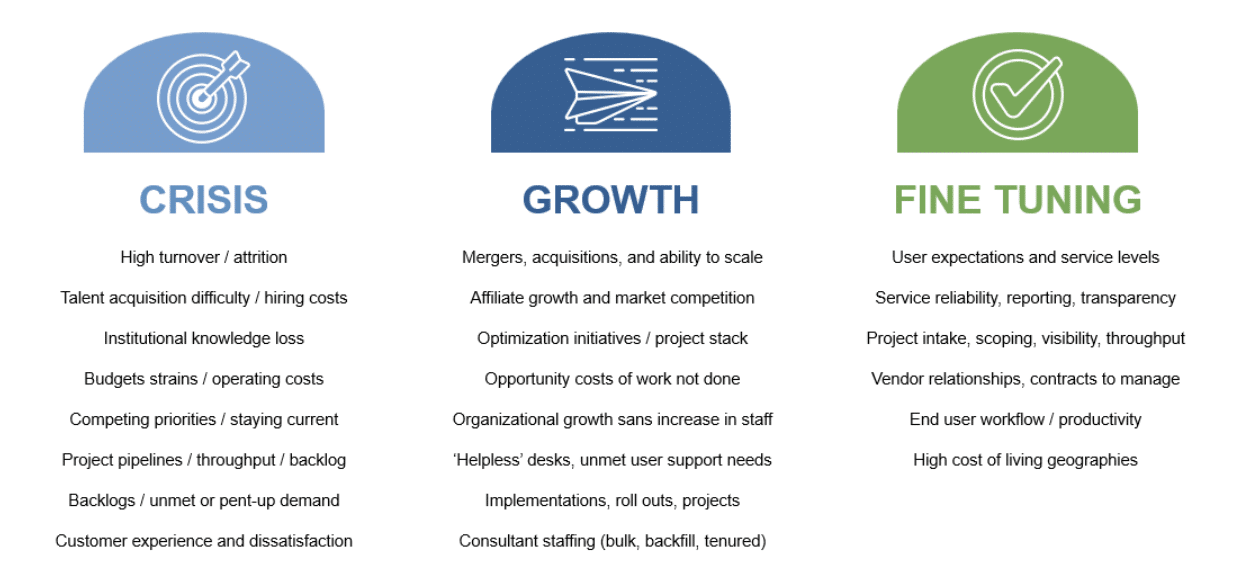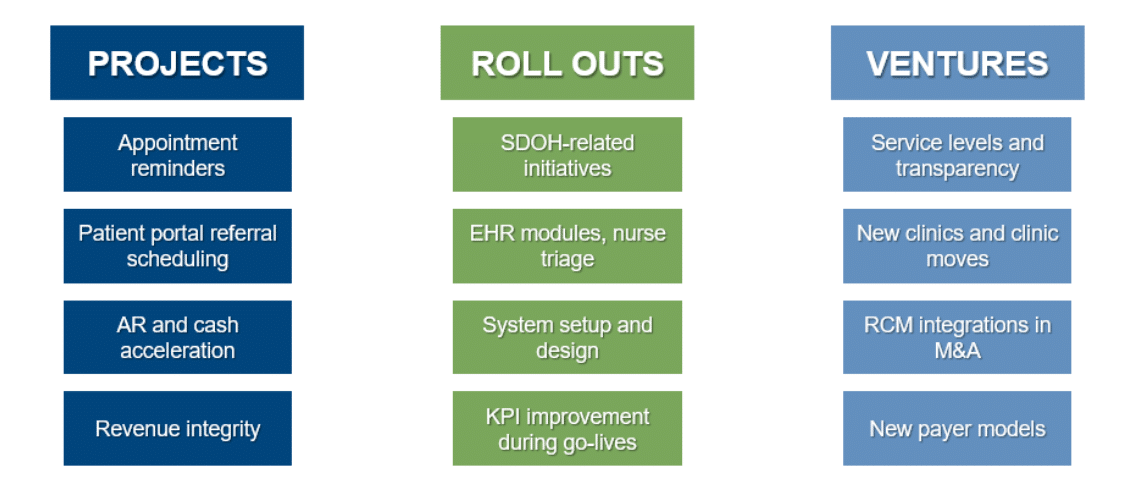In today’s environment, every health system is trying to balance its strategic priorities and unique challenges to gain stability.
For hospitals and health systems in the current market, the list of high-priority operational projects and strategic initiatives continues to grow amid a litany of challenges. Some are struggling to financially survive, plagued by high attrition, staffing shortages, cost constraints, and margin pressures. Others are in a period of aggressive growth, whether involved in an M&A event or pursuing other strategic ventures to ensure the organization is well-positioned for the future. Despite unique challenges and specific priorities, a common thread among hospitals and health systems is they are all seeking stability.
Healthcare organizations often see outsourcing as a means to optimize cost, but it can deliver much more.
Outsourcing is a proven way for hospitals and health systems to lower costs. For example, in our experience, revenue cycle outsourcing can save more than 10% of the total cost of an RCM operation and can drive cash improvement of 4%. Similarly, outsourcing application managed services (AMS) can introduce immediate IT staffing savings upwards of 10% with further cost optimization in years to come. However, the value of outsourcing goes far beyond cost optimization. Outsourcing can also add stability to your business on several fronts.
Common Outsourcing Opportunities

Outsourcing can add financial, operational, and long-term stability to your business.
Outsourcing offers the financial stability that comes from predictable, capitated costs. AMS and revenue cycle outsourcing contracts are typically structured to deliver outcomes, with fixed fees, service levels, and risk-sharing to ensure the quality of the work. Hospitals and health systems can bring in high-quality talent without the burden associated with recruiting, training, and certifying staff. Return on investment (ROI) models are also shared and monitored throughout the partnership.
Additionally, operational stability is provided when everyday projects (such as infrastructure and workflow enhancements, regulatory compliance efforts, and department moves and changes) are consistently completed on time. Given the combination of competing priorities and attrition for many IT and revenue cycle teams, routine projects can quickly fall through the cracks if a hospital or health system is too single-threaded in certain roles – but most health delivery organizations do not have the luxury of having sufficient backfill in their IT and revenue cycle departments. Outsourcing has redundancies built in, so no matter what happens, your organization knows that everyday projects to “keep the lights on” will always get done, all of your contracted service-level agreements (SLAs) will be met, and there will be no loss of institutional knowledge due to attrition of staff.
Lastly, outsourcing adds stability for the future. The long-term success of any hospital or health system is directly tied to the ability to execute on their strategic plan. There is no shortage of initiatives among health delivery organizations, ranging from operational projects like cloud migration efforts to strategic ventures like targeted acquisitions – and many have strict time constraints associated with them.

Outsourcing can elevate your existing IT and/or revenue cycle staff to focus on those high-priority strategic projects, as the outsourced resources take care of routine activities. Instead of fighting everyday fires, your hospital or health system can be more programmatic about the larger strategic projects that can drive tangible increases in revenue. Outsourcing also adds stability for the future by providing scalability, enabling your organization to quickly adapt to changing needs as they arise.
The Bottom Line: Amid chaotic times in healthcare delivery, a good outsourcing partner can deliver much-needed stability to your business.
Whether your organization is looking to add stability to your business with AMS, revenue cycle outsourcing, or a combination of both, the right outsourcing partner is paramount. Your partner needs to:
- Understand and account for your business priorities. Every hospital and health system is facing its own unique challenges. One size definitely does not fit all.
- Be focused on outcomes. Adding stability to your business through outsourcing requires a partner who is not only focused on staffing but also on achieving tangible outcomes aligned with your strategic priorities.
- Be the right cultural fit. A good outsourcing partner adds stability to your business by making it a priority to adapt to your team and your culture – not requiring you to adapt to them and the way they operate.
Questions to Ask a Potential Outsourcing Partner:
- Is your outsourcing partner able to tailor its solutions to your specific needs?
- Are leaders at the outsourcing firm willing to take the time to truly understand your strategy and your core business objectives?
- Is the firm respectful of the initiatives you already have underway, and focused on how they can add value to those efforts?
- Are they incentivized to listen, challenge, adapt, and remain focused on your best interests?
- Do the resources at the firm have real-world operations experience and the technology expertise needed to fully comprehend the impacts of each decision made?
- Does your partner offer outcomes-based solutions that reflect your enterprise goals?
- Prior to partnering, will the firm make the effort to understand your hospital or health system’s unique way of doing business, as well as your norms and values?
- Do they have the right talent to support your work?
Impact Advisors offers comprehensive Application Managed Services and Revenue Cycle Outsourcing services to support your goals.



